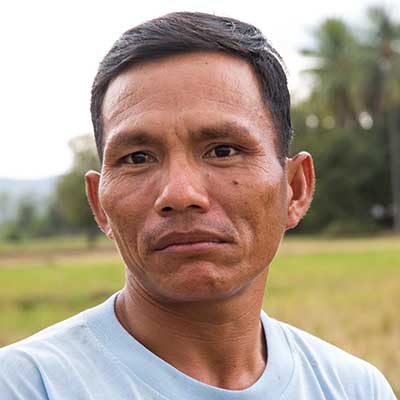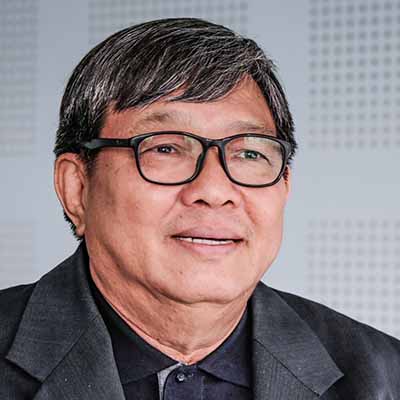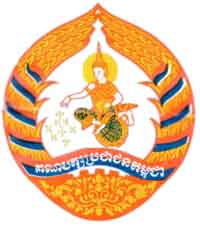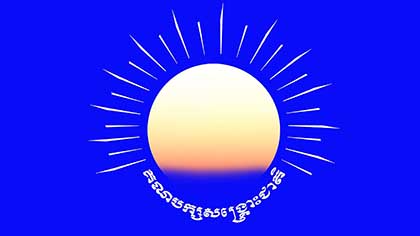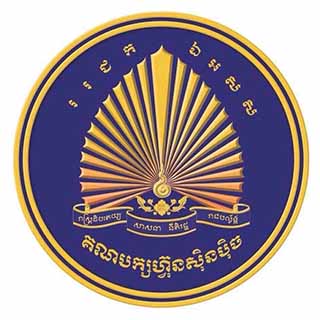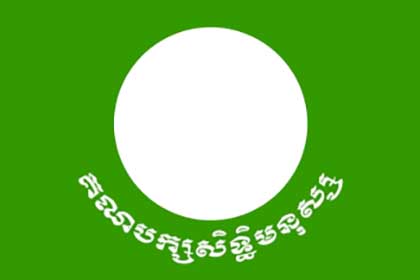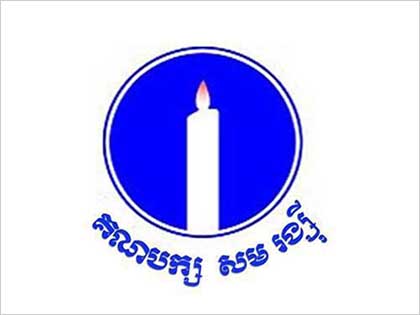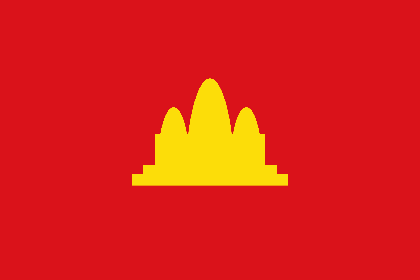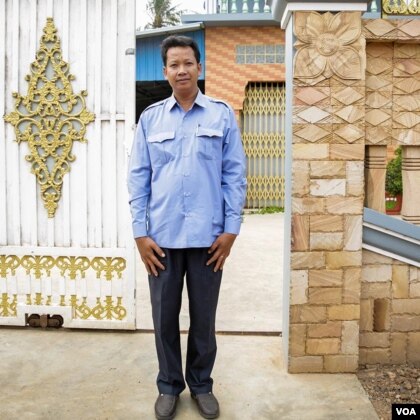
Commune Chief Da Chhean fled Thmar Puok as an 11-year-old with his family to a refugee camp in Thailand in 1983, and before returning home in the early 1990s. (Khan Sokummono | VOA Khmer)
Politicians’ Voices
Cambodia’s Only Remaining Opposition Commune Chief Vows to Carry On
Da Chhean was spared from Prime Minister Hun Sen’s crackdown as he represents a small party – now he is Cambodia’s last commune chief not affiliated with the ruling party.
Thmar Puok Town, Banteay Meanchey Province On a recent morning in the small, dusty center of Thmar Puok town, farmers were making their way to and from the local market and hardware stores, while in his fenced residence along a paved road, Commune Chief Da Chhean was taking calls and receiving local residents.
A tall, mild-mannered man respected as a community leader, Da Chhean, 48, lived through the war and displacement that marked this border region in western Cambodia until peace came in the late 1990s.
| By the numbers | National |
|---|
“The people believe in me because I am always here on the ground to seek solutions whenever they have any problems or concerns,” Da Chhean said when asked how he won two consecutive commune elections, most recently in June 2017.
Touch Sarun, 64, a town resident who runs a small motorcycle repair shop, voted for him. “Chhean is a good leader, he said. “Whenever we show up at the commune office we are very much welcomed; he is very friendly and eager to assist.”
The local community dynamics that propelled Da Chhean to elected office inThmar Puok have similarly produced many popular commune chiefs from the ruling and opposition parties across Cambodia, even though independent candidates cannot contest the office by law.
This suddenly all changed in November last year when the long-ruling Cambodian People’s Party (CPP) government used the courts to dissolve its main challenger, the Cambodia National Rescue Party (CNRP), ahead of the upcoming July 29 general elections.
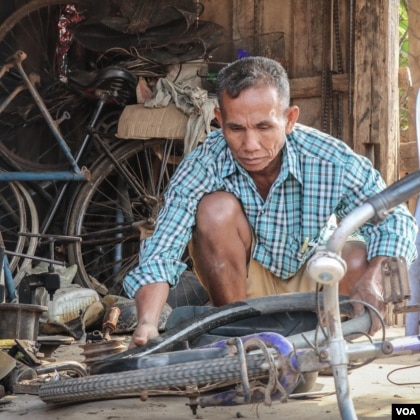
Touch Sarun, 64, a town resident who runs a small motorcycle repair shop, voted for Da Chhean. “He is very friendly and eager to assist.” (Khan Sokummono | VOA Khmer)
CNRP leader Kem Sokha was arrested and the CPP hastily divided the CNRP-held 45 percent of parliament seats among smaller opposition parties, while it took over the CRNP’s 489 commune chief positions by law or by defections.
The political crackdown gave the CPP near total commune-level control, leaving only one last non-CPP chief standing across Cambodia’s 1,646 communes: Da Chhean.
The reason for his unusual political survival is his party affiliation; he represents the Khmer National United Party (KNUP) – one of the 19 small parties that have been allowed to compete in the upcoming polls as they pose no electoral threat to the CPP, according to critics, and provide a veneer of multiparty democracy that suits the government.
Asked how he felt about being the last opposition commune chief, Da Chhean replied stoically: “I do not feel there is any pressure on me as a (opposition) commune chief because I act in line with the laws that have granted me the authority to serve my people.”
Though commune chiefs have limited powers and few resources, they play an important role as the elected officials closest to the community. They provide civil administration documents, officiate property transfers, discuss local development projects, and recommend provincial and district councilors.
Ear Sophal, a U.S.-based academic who studies Cambodia’s politics and international relations, said the recent crackdown had essentially returned local governance to its non-democratic, pre-2002 era when commune chiefs were appointed by the government.
“Back then, it was 100 percent CPP at the local level, now 99.9 percent of the commune chiefs are CPP. We need more than just Mr. Da Chhean though and even he is scared, as is everyone else,” said Ear Sophal.
Currently, the KNUP holds one commune chief position and no parliament seats.
Asked about his and the KNUP’s outlook in the current political climate, Da Chhean said: “As a political movement, I feel uncertain about our political future.”
‘People desire change’
On July 7, election campaigning kicked off in Phnom Penh where the public mood was subdued and the CPP’s dominance obvious, with Prime Minister Hun Sen addressing a crowd of 60,000 CPP members and supporters, while rallies by other parties gathered only a fraction of this turnout.
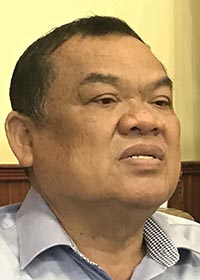 Nhek Bun Chhay
KNUP leaderKNUP leader Nhek Bunchhay addressed a rally of some 600 people near his Phnom Penh home, which is also the party’s headquarters, telling them that if his party wins it would implement government reforms to address widespread problems such as land grabbing.
Nhek Bun Chhay
KNUP leaderKNUP leader Nhek Bunchhay addressed a rally of some 600 people near his Phnom Penh home, which is also the party’s headquarters, telling them that if his party wins it would implement government reforms to address widespread problems such as land grabbing.
Of the 19 small parties challenging the CPP, critics believe only one – the Grassroots Democratic Party set up by assassinated political analyst Kem Ley and now led by agronomist Yang Saing Koma – is reportedly independent from the current political establishment.
Though Da Chhean easily beat the local CPP and CNRP candidates in commune elections, he noted that local voters tend to vote strategically for the two major parties in national polls, but are now deprived of their national favorite.
“People desire … change in Thmar Puok Commune and the CNRP would receive, to be frank, a lot more votes than any other parties if it could enter the race,” he said, adding that most locals were indifferent to the upcoming polls after the CNRP’s dissolution.
“People are living in fear and laying low. We are shocked and have no idea what direction we are heading.”
“It is just like watching a kid who was put in the ring to fight an adult – no one would bother to bet,” he said
Resident Touch Sarun added, “People are living in fear and laying low. We are shocked and have no idea what direction we are heading.”
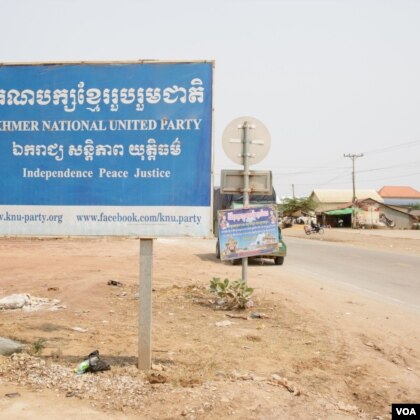
In a nation dominated Prime Minister Hun Sen’s ruling party, the Khmer National United Party (KNUP) sign in Thmar Puok recalls the recent multi-party past. (Khan Sokummono | VOA Khmer)
Relic of a bygone political era
Da Chhean is not only the last remnant of multiparty democracy at the commune level, but also a relic of the political history of Cambodia and in particular this region in Banteay Meanchay Province.
The KNUP is dominated by the former warlord who once held sway in this former stronghold of royalist forces of then-Prince Norodom Sihanouk, which fought against then Vietnam-backed government of Hun Sen until 1991 in western jungles of Cambodia.
Later, the royalist Funcinpec party mounted a credible challenge the CPP at the polls, but by the mid-2000 Hun Sen had pushed the party into margins through political maneuvering and violence. In 2015, Nhek Bun Chhay split from Funcinpec to form the KNUP and become a small political player operating at the mercy of Hun Sen.
Da Chhean lived through the region’s turbulent past, facing conflict before fleeing as an 11-year-old from Thmar Puok with his family to a refugee camp in Thailand in 1983, and eventually returning in the early 1990s.
“My families and others in Thmar Puok turned to bunkers as our nighttime beds to evade the shelling and artillery exchanges,” he recalled.
“In the camp, I saw the people in uniform or neak thom [high-ranking people] then I dreamt of becoming one of them, so I gave the political life a test,” he said.
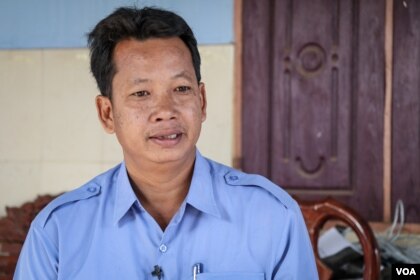
Da Chhean won two consecutive commune elections in Thmar Puok, most recently in June 2017. He is the face of Cambodia’s government for most residents. (Sun Narin | VOA Khmer)
He joined the organization of then-Prince Sihanouk’s resistance and then-Commander Nhek Bun Chhay, an imposing man now in his 60s with a square jaw, covered with traditional Khmer tattoos that, he believes, have magical powers to protect him from danger. Da Chhean later switched from Funcinpec to KNUP to follow the general.
However, his leader’s fortunes took another hit last year, when Nhek Bun Chay was thrown in jail for a decade-old allegation of drug trafficking but then released on bail in late April — just in time to resume leadership of his party ahead of the upcoming polls.
Regardless of his party’s near disappearance, Da Chhean said he would continue to support the KNUP and work to address the problems of his community of farmers, many of whom were sliding into poverty due to rising debt levels, and even forced to migrate to nearby Thailand in search of work.
“I still appreciate taking part in the campaign of our party leading up to the July 29 poll,” he said. “We think that in the upcoming election, [the KNUP] may not be able to win even a single seat, but with our love for His Excellency Nhek Bun Chhay, we will try our best.”

